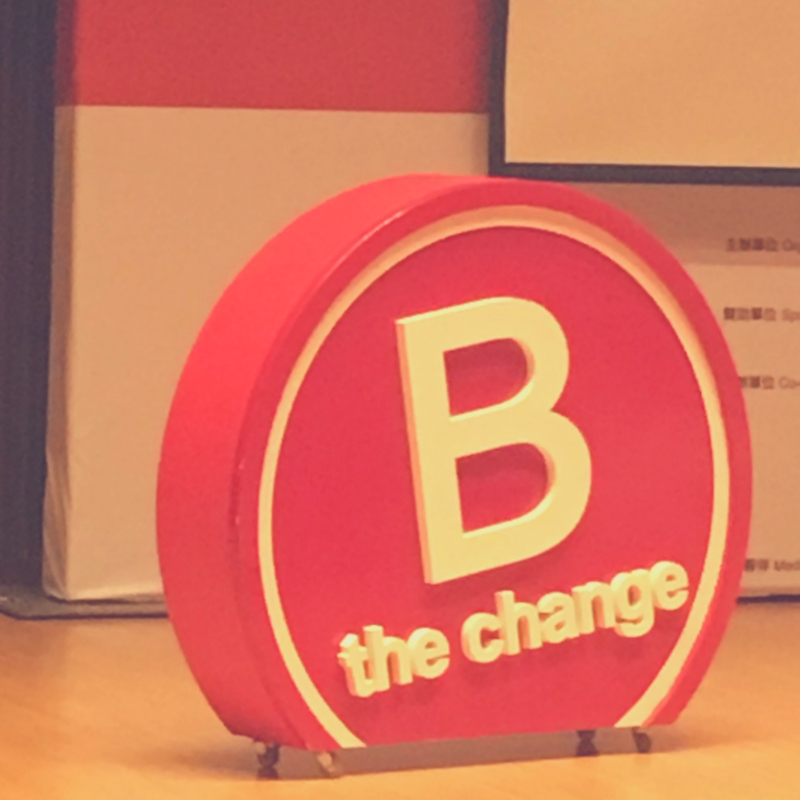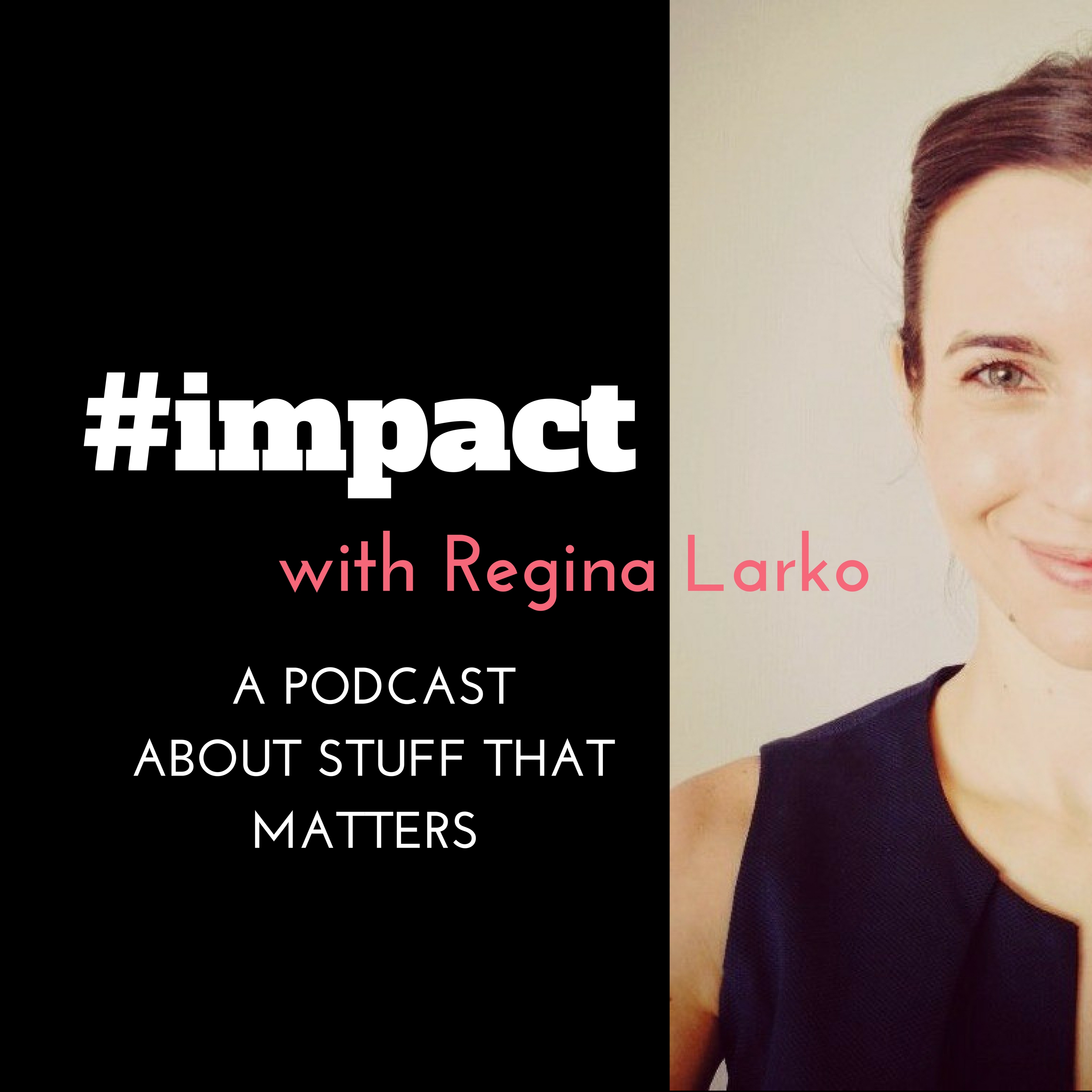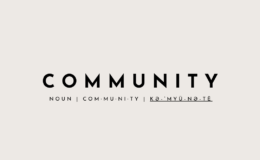500 people from around the Asia-Pacific region gathered to share their efforts to “B the change”, promoting and progressing the global B Corp concept that seeks to redefine success in business as more than just share price.
B Corps earn certification by demonstrating high scores on governance, environmental stewardship and social considerations in regards to their employees, their customers and their community. They are companies dedicated to being exemplary corporate citizens but are not necessarily set up to deliver positive impact. This means that accountancy firms, as well as organic farms, can become B Corps.
It’s about how you do business, not what your business is.
The B Corp Asia Forum was hosted by Taiwan’s B Lab, an organisation that promotes Taiwan’s 19 certified B Corps and is supporting another 110 companies through the application process.
B Corps are an American invention, but the programme has become more global in recent years with countries working with B Lab Global to adapt its certification standards to better fit local laws and customs.
Thailand announced their first B Corp at the summit, and brought along 15 people from business, government and media to learn how to use B Corps to help achieve their ambitious SDG (UN Sustainable Development Goals) commitment.
The social enterprise Education for Good represented Hong Kong.
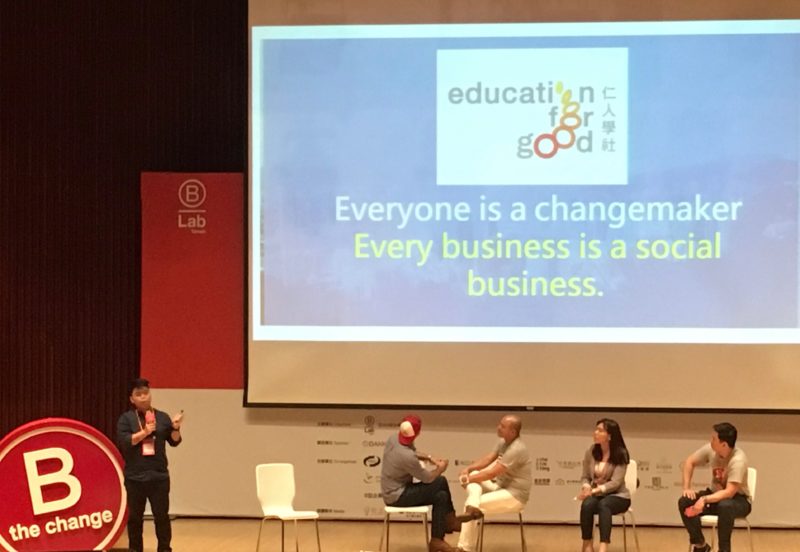
Education for Good’s Freddy Law shares his organisation’s journey to become Hong Kong’s first B Corp
Executive Director Freddy Law shared how he first laughed when he heard about B Corps, unable to imagine ultra-capitalist Hong Kong companies focusing on anything other than financial profit.
Two years later and he’s a convert, helping other companies widen their focus to include other stakeholders alongside their shareholders.
Speakers kept talking about B Corps as a movement, not a moment – a very American cheerleader-esque statement that sounded a little alien coming through my translation headsets. But this community spirit is a key factor in its success as B Corp CEOs often take on roles or set up non-profit B Labs, the vehicles promoting the B Corp brand amongst governments, investors and prospective employees.
David Chang, co-founder of B Lab Taiwan, explained that being a B Corp is about the DNA of the business, not just its activities.
The application process is rigorous and requires companies to continue striving for improvements each year to maintain certification. Companies need to have a “business for good” mentality at their core.
Whether they were start-ups or established companies, impact-led organisations or just accountants wanting to make a difference, the B Corps up on stage talked a lot about purpose, collaboration and trust.
One of the most compelling stories about purpose came from Damien Guivarra, the CEO of Silver Chef, a company that offers short term financing to small businesses for restaurant equipment.
It’s a 30-year-old Australian company, publicly traded since 2005. After a rough couple of years, Silver Chef reviewed its direction in 2009, establishing company values and a simple purpose statement that addressed both its for-profit business and its philanthropic support of Opportunity International – “to help people achieve their dreams”. This purpose drives everything from the company’s refugee hiring programme to how they treat their customers. Becoming a B Corp in 2015 further cemented its commitments to social and environmental goals. Damien credits the company’s B Corp mentality for its impressive growth from AUD$10m in 2009 to AUD$300m today.
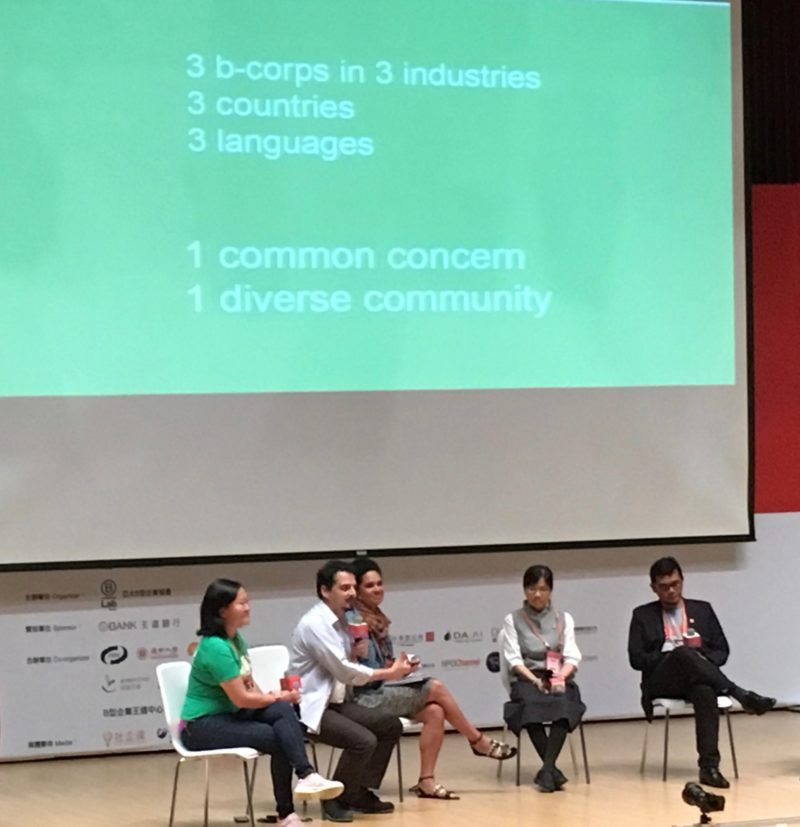
Tammy from DOMI, Sergio from Lab 60+ and Mele-Ane from Dumbo Feather explain their collaboration to help people around the world reduce energy consumption
Collaboration and interdependence were common themes as well.
Three attendees told about how they met at a recent B Corp conference and decided to collaborate across time zones and languages to increase energy efficiency awareness.
Taiwan’s DOMI had developed a simple stoplight monitor to help people understand how much electricity they are using. Australia’s Dumbo Feather, a sustainability magazine, helped translate it to English and develop promotional materials. Brazil’s Lab 60+ added Portuguese translation and training materials geared to its members, a cross-generational mix of over 60s and under 25s.
Earning customer trust, employee trust and regulator trust were other factors encouraging companies to pursue B Corp certification.
Taiwan’s O Bank, going through the process at the moment, planned to provide low-cost services to fellow B Corps, as the governance requirements ensured they would be trustworthy customers. AVPN, a network of philanthropists and impact investors across Asia, agreed that investors were actively looking to back B Corps, confident in their governance and reporting practices.
Not all businesses can be social enterprises – organisations that think about delivering positive impact at least as much as (and often more than) financial gain.
But all companies can become B Corps…
…paying more attention to how they impact the world around them and measuring success not just as financial profit, but as the sum total of how their activities impact all of the stakeholders around them.
If you want to learn more about B Corps, the B Corp Consulting Group is offering “B Leaders” courses to train people interested in becoming B Corp consultants or ambassadors. They also offer free monthly workshops (in Cantonese and English) for businesses interested in learning about the certification process.
The Social Enterprise Summit November 5-10 will also have a number of sessions focusing on B Corps.
About the author:
Amanda Williams joined #impact Podcast to help promote the social innovation sector and provide more content for changemakers. She arrived in Hong Kong from the UK where she worked in start-ups, innovation and impact investing. She is passionate about equality, the ocean, renewable energy, and baking.
